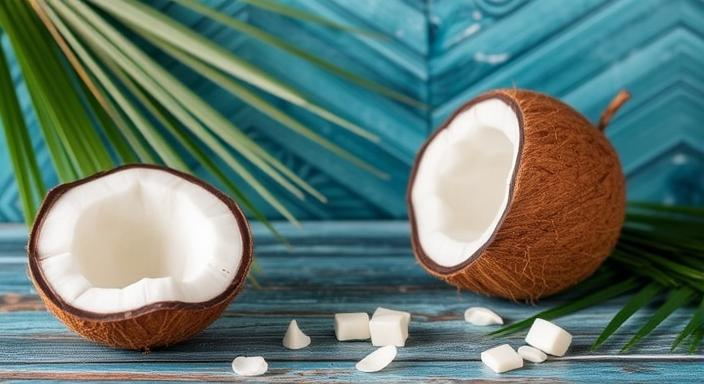Health Benefits of Coconut
They’re exotic and out-of-the-ordinary. They are readily available in balmy and tropical climates. And they have a tantalizing flavor that is irresistible to passionate “foodies” and “in-the-know” connoisseurs. What are they? They’re coconuts! And they have been a nutritious source of meat, juice, milk, and oil down through the annals of history. In many cultures, they have been the mainstay of the diet, with many health benefits. It wasn’t in the far too distant past that coconuts received a “bad” name because they were said to cause heart disease and other health problems. It turns out now—according to solid scientific research—that coconuts aren’t unhealthy at all, and that they actually “slow or stop” the progression of many diseases. The locals knew it all along. Science just needed some time to catch up!
So how did coconuts get such a “bad rap” in the first place? By the mid-twentieth century, giant food-processing factories began using high heat and chemicals to “harden” oils for the production of margarine and other hard fat products (called hydrogenation). The problem was, all that heat and hydrogenation turned a totally natural “oil-bearing” product—soybeans, corn, coconuts, nuts and the like—into toxic brews! Thankfully today, science understands that the process of hydrogenation is deadly and can be blamed for many diseases.
Coconuts are now considered “nature’s tropical gift of health” because they promote health, help prevent a plethora of diseases and are generally considered good for you! Products containing coconut are everywhere today, and you can find trendy items like coconut water, coconut nectar and coconut fiber bars in gyms, SPAs and upscale beauty shops alike!
The Healthy Benefits of Coconut
There are two kinds of coconuts available—the mature, dark brown coconuts we are all familiar with. Then, there is the “newest” addition to the marketplace—fresh, young, green coconuts. Both have fats (called fatty acid chains) that promote health. The particular kind in coconuts are “medium chain triglycerides,” or MCTs for short.
MCTs are generally not “stored” as fat, but are burned rapidly for energy, much like placing kindling on a fire rather than a water-soaked log. Author Bruce Fife, N.D., says in his book, The Healing Miracles of Coconut Oil, “All fats…contain the same number of calories. Medium-chain fatty acids (MCTs), however, are different. They contain a little less and actually yield slightly fewer calories than other fats.”
One of the most studied benefits to coconut oil is how it affects the heart. In one study, 40 women were either given coconut oil or soybean oil daily for 12 weeks. The “unfortunate” soybean group saw decreases in their good cholesterol ((HDL) and increases in their bad cholesterol (LDL). But the “coconut-oil-taking” group showed a higher “good” cholesterol number. Not only that, but the researchers said the coconut oil appeared to reduce abdominal fat, as reported in the journal Lipids. And that’s a good word for anyone who wants to lose their belly flab!
Anyone with thyroid issues? The thyroid is the master gland that regulates metabolism and other body functions. Because coconut oil is such a rich source of MCTs, it can boost your metabolism by up to 50%, according to Ann Louise Gittlemen, world-class nutritionist, author and researcher.
Gittlemen explains that because the fats in coconut oil are fast burning, they create a very efficient fuel— not only for your thyroid but also for your brain. This process helps to produce clearer thinking and in fact, she says, “The MCTs produce substances (ketones) in the breakdown of fats for energy which can play a major role in treating Alzheimer’s and other neurodegenerative diseases.”
Another reported benefit to coconut oil is that it is “thermogenic,” which means it tends to cause more fat burning when compared to calories from other fats. In other words, eating it tends to increase energy expenditure (fat burning) compared to the same amount of calories from other fats.
In one study reported in the European Journal of Nutrition, one to two tablespoons of MCTs from coconut oil were shown to increase energy output by over 5%. This totals about 120 calories a day. And who wouldn’t like to save 120 calories? There a several other studies that confirm these findings. Researchers who headed several studies concluded by saying that MCTs, “may prevent long-term weight gain via increased energy expenditure.”
Another benefit to coconut oil is its ability to kill bacteria, viruses and fungi. Almost 50% of the fatty acids in coconut oil are a form called Lauric Acid. Lauric acid has been shown to kill the bacteria Staphylococcus Aureus (a very dangerous pathogen) and the yeast Candida Albicans, a common source of yeast infections in humans. This makes coconuts function as a potent antiviral, antifungal and anti-parasitic food.
So why not give your diet a “one-two punch” by incorporating some delicious and health-promoting coconut into your meals? You can eat the raw pulp in a variety of ways, or drink the coconut water from the heart of the fruit. You might try dehydrating thin strips from young coconuts, then marinate the strips with teriyaki sauce or other favorite flavors. Dehydrate to create a snack that tastes amazingly similar to beef jerky!
However you choose to use coconut, you can’t go wrong by adding it to your diet. Nutritionists, researchers and health nuts alike say eating coconut is a great way to create good health, while staving off a plethora of chronic and acute diseases. Give it a try. You’ll probably be glad you did!
